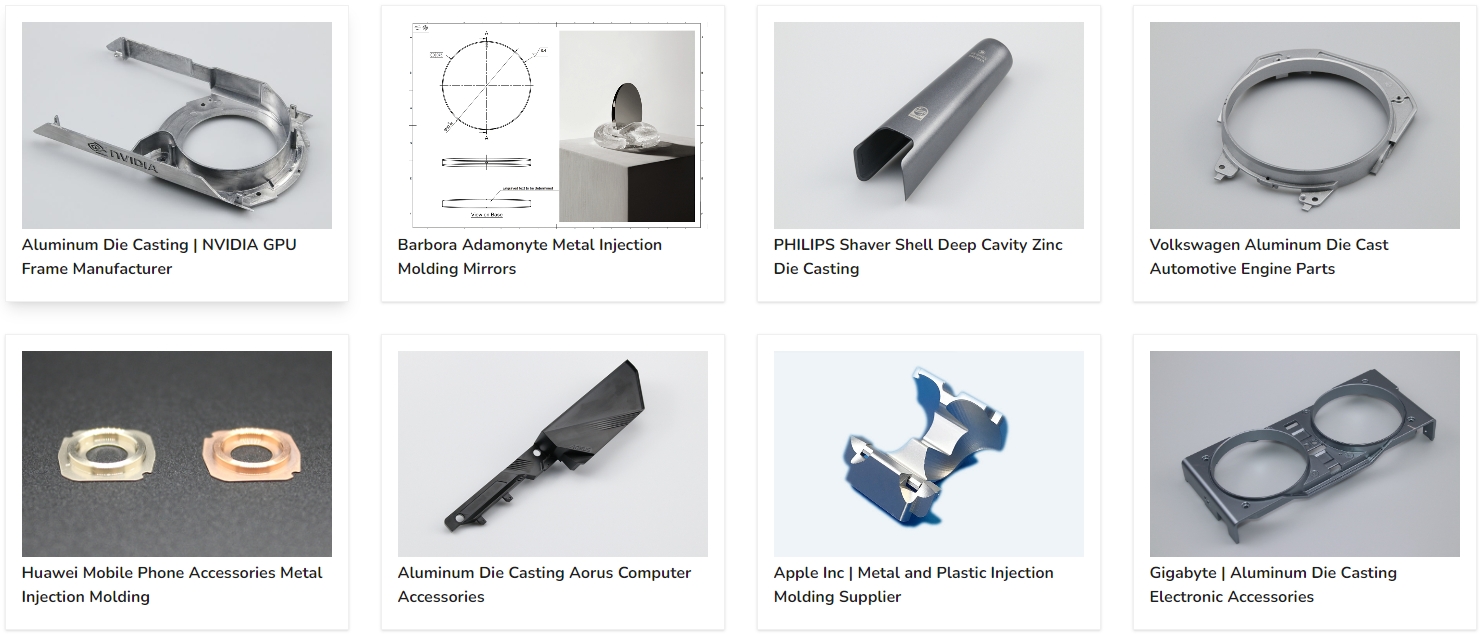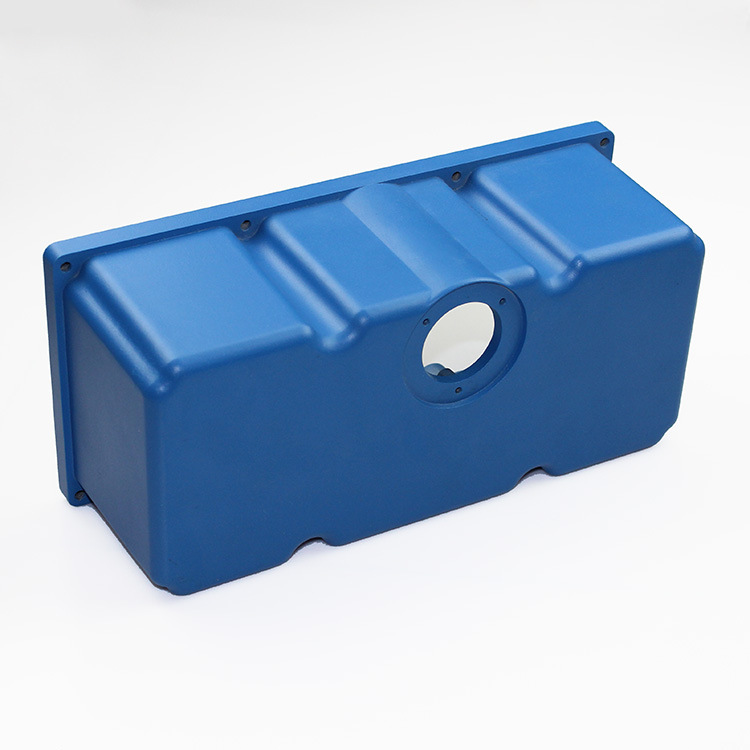Custom Manufacturing of Aluminum Die-Cast Shell Housing with Powder Coating
In the rapidly evolving world of telecommunications, 5G technology has brought about a significant demand for robust, high-quality components that can withstand the rigors of high-speed data transmission and extensive usage. One critical component in this technology infrastructure is the aluminum die-cast shell housing used in 5G base stations. To ensure optimal performance, these housings must meet stringent durability, precision, and finish requirements.
This case study explores the custom manufacturing process of aluminum die-cast shell housings with powder coating explicitly tailored for 5G base stations. We will delve into the advanced manufacturing techniques, the choice of die-cast materials, and the meticulous quality standards, showcasing how Neway Precision delivers on-demand custom manufacturing and mass-production solutions. Through this detailed examination, we aim to highlight the critical role of precision engineering and innovative manufacturing processes in supporting the 5G revolution.
Technology Used
In customizing aluminum die-cast shell housings for 5G base stations, advanced technologies are employed to ensure precision, durability, and quality. These technologies are integrated seamlessly to deliver a product that meets stringent industry standards and customer requirements.
Aluminum Die Casting
Aluminum die casting is the initial step in the manufacturing process. This method involves forcing molten aluminum into a steel mold under high pressure. The result is a precise, high-strength component with excellent dimensional accuracy. Aluminum die casting is particularly advantageous for producing housings and shells due to its ability to create complex shapes with tight tolerances. Using ADC 12 aluminum alloy ensures the final product has excellent corrosion resistance, mechanical properties, and thermal conductivity.
CNC Machining
Once the basic shape of the housing is created through die casting, CNC machining is employed to achieve intricate details and precision features. CNC (Computer Numerical Control) machines use pre-programmed software to control the movement of tools, allowing for high precision in cutting and shaping the material. This step is crucial for meeting the ISO 2768 mk tolerance standards, ensuring that every part of the housing fits perfectly and performs reliably.
Threading
Threading is added to the housing to facilitate assembly with other components. This process involves cutting screw threads into the material, which is essential for creating secure and detachable joints. Precise threading ensures that the assembled components maintain structural integrity and can withstand the operational stresses of a 5G base station.
Polishing
Before applying the final surface finish, the housing undergoes a polishing process. Polishing smoothens the surface, removing any imperfections and preparing it for coating. This step enhances the overall appearance of the housing. It ensures the powder coating adheres appropriately, producing a uniform and durable finish.
Powder Coating
The final step in the manufacturing process is powder coating. It involves applying a dry powder to the surface of the housing and then curing it under heat. The powder coating provides a durable, high-quality finish that is resistant to chipping, scratching, and fading. It also offers excellent protection against environmental factors, ensuring the longevity and reliability of the 5G base station components.
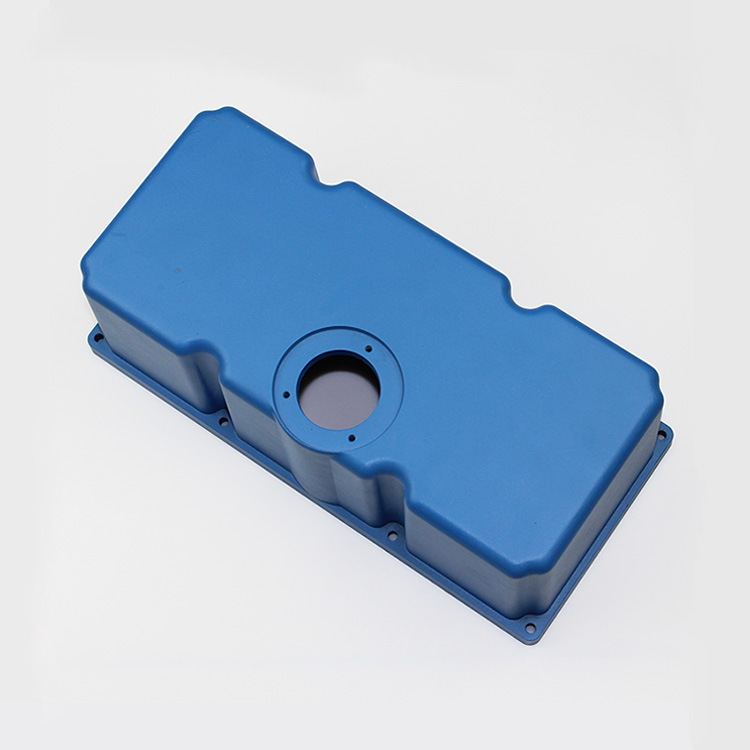
Die Cast Material: ADC 12
In manufacturing aluminum die-cast shell housings for 5G base stations, the choice of material is crucial for ensuring the final product's performance and reliability. For this application, we use ADC 12, an aluminum alloy renowned for its excellent properties suited to die casting and machining processes.
Properties of ADC 12 Aluminum Alloy
ADC 12 is a high-quality aluminum alloy with several advantageous properties, making it ideal for die-cast components. Critical properties of ADC 12 include:
High Strength-to-Weight Ratio: ADC 12 provides significant structural strength while being lightweight, which is essential for reducing the overall weight of the 5G base station components without compromising their durability.
Excellent Corrosion Resistance: This alloy exhibits strong resistance to corrosion, which is vital for components exposed to various environmental conditions, ensuring a long service life.
Good Thermal Conductivity: ADC 12 has efficient thermal conductivity, which helps manage heat dissipation, a critical factor for electronic housings in 5G base stations that operate continuously.
Dimensional Stability: The alloy maintains its shape and dimensions under varying temperatures, ensuring the precision and reliability of the components.
Suitability for Die Casting and Machining
ADC 12's properties make it highly suitable for the die-casting process. The alloy's excellent fluidity allows it to fill molds and create intricate shapes with fine details, which is necessary for producing complex housings and shells. Additionally, ADC 12's ability to maintain dimensional accuracy during the cooling process ensures that the final product meets precise specifications.
Regarding CNC machining, ADC 12's machinability allows for the creation of detailed and precise features, such as threading and other intricate designs required for the 5G base station housings. The material's stability during machining processes ensures that the components maintain tight tolerances, adhering to the ISO 2768 mk standards.
Resistance to Corrosion and Wear
The inherent corrosion resistance of ADC 12 is a significant advantage for components used in outdoor or harsh environments. The alloy forms a protective oxide layer on its surface, preventing further oxidation and degradation. This property is crucial for 5G base station housings, which must remain functional and intact despite exposure to various environmental factors such as moisture, UV radiation, and temperature fluctuations.
Furthermore, ADC 12 exhibits good wear resistance, reducing the likelihood of mechanical degradation over time. It ensures that the housings and shells maintain their structural integrity and performance throughout their operational life.
Surface Finish: Powder Coating
The surface finish of a component not only impacts its aesthetic appeal but also plays a crucial role in its durability and performance. For the aluminum die-cast shell housings used in 5G base stations, powder coating is the preferred surface finish due to its numerous advantages.
Process of Powder Coating
Powder coating is a finishing process where a dry powder, composed of finely ground particles of pigment and resin, is applied to a metal surface. The process involves several key steps:
Surface Preparation: The aluminum housing is first cleaned and pre-treated to remove contaminants and improve adhesion. It often includes degreasing, etching, and rinsing.
Application: The powder is applied using an electrostatic spray gun. The gun imparts an electrical charge to the powder particles, which are then attracted to the grounded metal surface, ensuring even coverage.
Curing: The coated part is placed in an oven where the powder is heated to its melting point. It then flows and forms a continuous film over the surface. Once cooled, the coating solidifies into a durable, high-quality finish.
Advantages of Powder Coating
Powder coating offers several benefits that make it an ideal choice for 5G base station housings:
Durability: The cured powder coating creates a tough, resilient layer resistant to chipping, scratching, and fading. It is essential for components exposed to outdoor environments and rough handling during installation and maintenance.
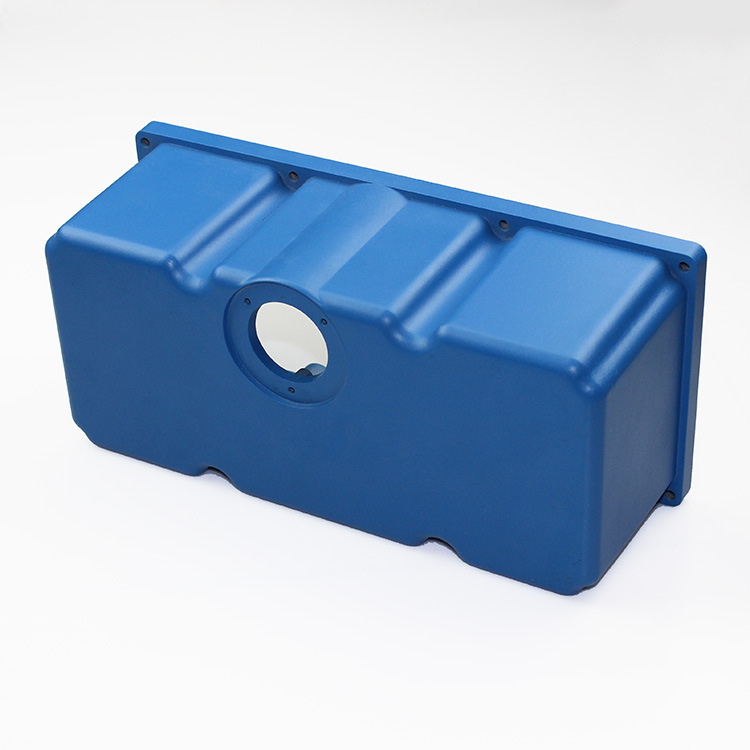
Environmental Friendliness: Unlike liquid paint finishes, powder coating does not contain volatile organic compounds (VOCs) or hazardous air pollutants (HAPs). It makes the process more environmentally friendly and compliant with regulatory standards.
Aesthetic Appeal: Powder coating is available in various colors and finishes, from matte to glossy and textured surfaces. It allows for customization and enhances the visual appeal of the 5G base station housings.
Uniform Coverage: The electrostatic application ensures that the powder is evenly distributed over the entire surface, including complex shapes and hard-to-reach areas, resulting in a consistent, high-quality finish.
Corrosion Resistance: The coating provides an effective barrier against moisture and other corrosive elements, protecting the aluminum housing from oxidation and extending its lifespan.
Quality Standards and Visual Appeal
At Neway Precision, we adhere to stringent quality standards to ensure that every powder-coated housing meets our clients' expectations. The process is carefully monitored and controlled for the desired coating thickness and uniformity. Each coated component undergoes rigorous inspection to check for defects, such as pinholes, runs, or sags.
The visual appeal of the powder-coated finish is also a significant consideration. For 5G base stations, a sleek and professional appearance is essential. Powder coating enhances the aesthetic appeal and conveys a sense of quality and reliability, which is critical for equipment that represents cutting-edge technology.
Product Application: Housings and Shells for 5G Base Stations
The aluminum die-cast shell housings we manufacture play a critical role in the infrastructure of 5G base stations. These components are designed to protect sensitive electronic equipment and ensure the reliable operation of 5G networks, which require robust and high-performing hardware.
Role of Housings and Shells in 5G Base Stations
Housings and shells are essential components in 5G base stations, serving several vital functions:
Protection: They shield internal components from environmental hazards such as dust, moisture, and temperature fluctuations. This protection is vital for maintaining the integrity and performance of the base station's electronics.
Structural Support: These housings provide the necessary support to mount and secure various internal components, ensuring they remain in place and operate correctly.
Heat Dissipation: Effective thermal management is crucial for 5G base stations, which generate significant heat during operation. The aluminum housing aids in dissipating heat, preventing overheating, and extending the lifespan of the electronic components.
EMI Shielding: The housings help shield the sensitive electronics from electromagnetic interference (EMI), which can affect signal quality and data transmission.
Specific Requirements for These Components
The housings and shells for 5G base stations must meet several specific requirements to ensure they perform their intended functions effectively:
Precision and Tolerance: Components must be manufactured to exact dimensions and tolerances, adhering to ISO 2768 mk standards. It ensures a perfect fit and proper alignment of all parts.
Durability: Given the outdoor installation of many 5G base stations, the housings must withstand harsh environmental conditions, including UV radiation, rain, and wind.
Corrosion Resistance: To prevent degradation over time, the materials used must resist corrosion, particularly in coastal or industrial environments where exposure to salt and chemicals is daily.
Ease of Assembly: The design must facilitate quick and easy assembly, allowing for efficient installation and maintenance in the field.
Challenges and Solutions in Manufacturing
Manufacturing housings and shells for 5G base stations presents several challenges that require innovative solutions:
Complex Geometries: The design often involves intricate shapes and features to accommodate various electronic components and connectors. Advanced die casting and CNC machining techniques are employed to achieve these complex geometries with high precision.
Material Selection: Choosing a suitable material, such as ADC 12 aluminum alloy, is critical for balancing strength, weight, and thermal properties. ADC 12 provides the necessary characteristics to meet the demanding requirements of 5G base stations.
Surface Finish: Achieving a durable and aesthetically pleasing surface finish is essential. Powder coating provides a tough, corrosion-resistant layer that enhances the appearance and longevity of the housings.
Quality Control: Ensuring consistent quality across all manufactured units is vital. Rigorous inspection and testing processes are implemented to verify that each housing meets the required standards and specifications.
On-Demand Custom Manufacturing and Mass Production
Neway Precision's expertise in custom manufacturing and mass production has enabled us to deliver high-quality aluminum die-cast shell housings for 5G base stations efficiently and effectively. Our approach combines flexibility, precision, and scalability to meet the specific needs of our clients and the demands of the rapidly growing 5G industry.
Meeting the Specific Needs of Clients
Every 5G base station project comes with unique requirements and challenges. Our on-demand custom manufacturing process is designed to address these specific needs:
Customization: We work closely with our clients to understand their specifications and design requirements. This collaborative approach ensures that each housing is tailored to fit the intended application perfectly.
Rapid Prototyping: We can quickly produce prototypes for testing and validation using advanced rapid prototyping techniques. It allows for swift iterations and modifications, ensuring the final product meets all performance and quality standards.
Flexible Production Runs: Whether a client needs a small batch of specialized components or a large-scale production run, our flexible manufacturing processes can accommodate varying order sizes without compromising quality or lead times.
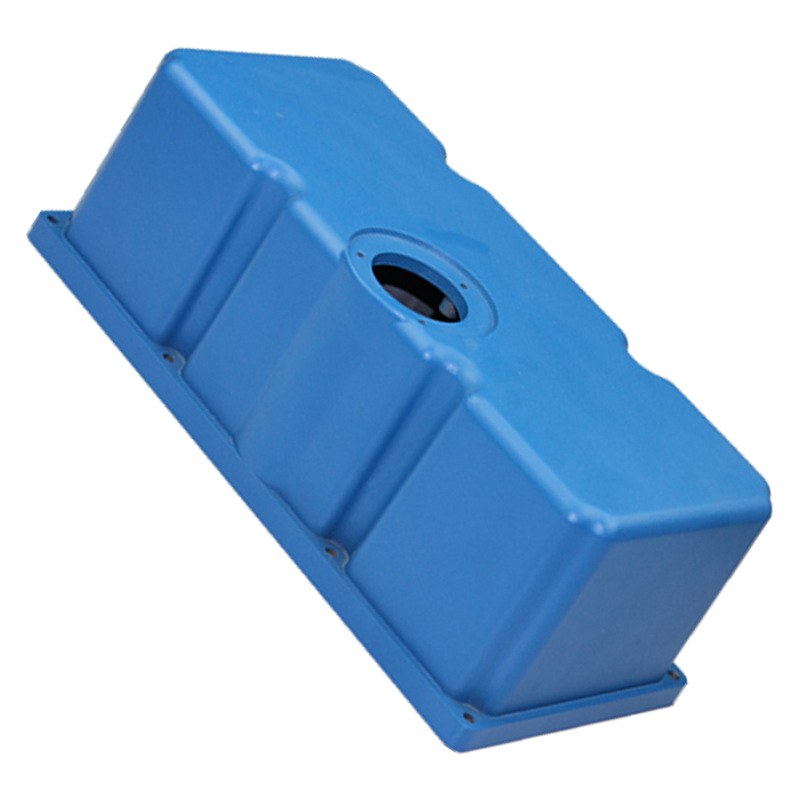
Balancing Custom Solutions with Mass Production Capabilities
One of the critical strengths of Neway Precision is our ability to balance the customization required for specific projects with the efficiencies of mass production:
Advanced Manufacturing Technologies: By integrating technologies such as aluminum die casting, CNC machining, threading, polishing, and powder coating, we achieve high precision and consistent quality in both custom and mass production environments.
Efficient Workflow: Our streamlined production workflow ensures we can seamlessly switch between custom manufacturing and mass production. This efficiency minimizes downtime and maximizes productivity, allowing us to meet tight deadlines.
Scalability: Our manufacturing facilities are equipped to scale up production as needed. This scalability ensures that we can handle large orders without sacrificing the attention to detail required for custom components.
Case Study Results: Efficiency, Quality, and Client Satisfaction
The results of our on-demand custom manufacturing and mass production capabilities are evident in the success stories of our clients:
Efficiency: By optimizing our production processes, we have significantly reduced lead times. Our clients benefit from faster turnaround times, allowing them to deploy their 5G base stations more quickly and stay ahead of their competition.
Quality: Stringent quality control measures ensure that every component we produce meets the highest standards of precision and durability. This commitment to quality translates into reliable and long-lasting 5G base station housings.
Client Satisfaction: Our focus on understanding and addressing each client's specific needs has led to high levels of customer satisfaction. We have built strong, long-term relationships with our clients, who consistently trust us to deliver exceptional products and services.
Brand Case Study
Neway has served many world-renowned companies, using its strong manufacturing capabilities and complete quality control system to provide further market competitiveness and quality assurance for major brands.
